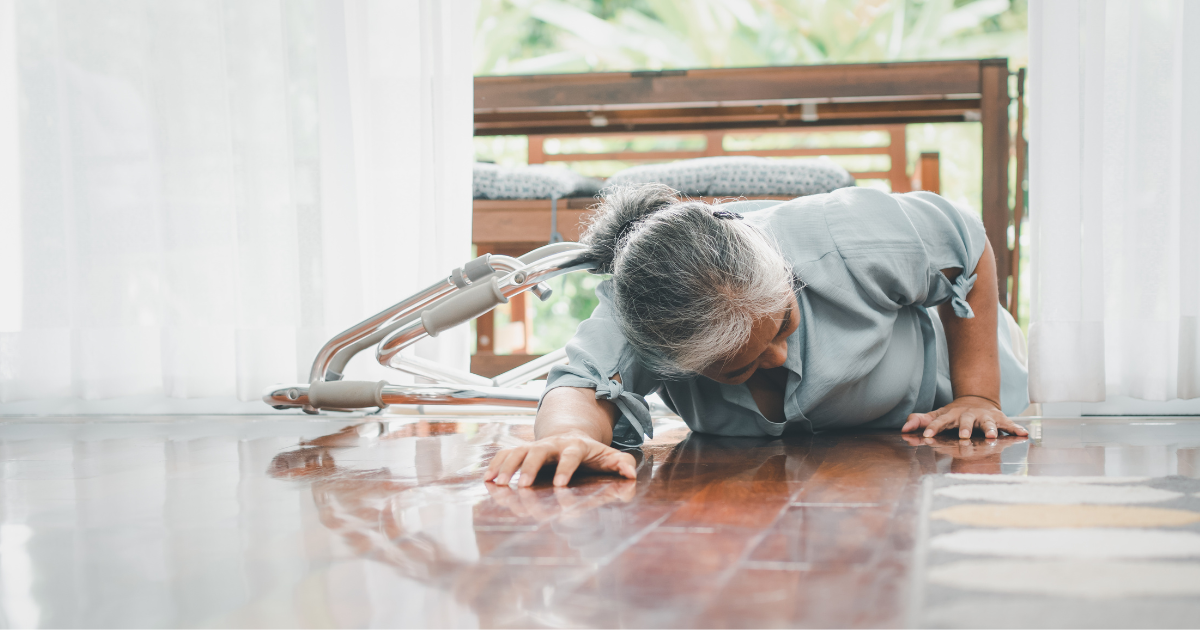One of the biggest fears for that aged 65-and-over is tripping and falling. In fact, one-in-four older Americans trip and fall every year, and falls are the leading cause of both fatal and nonfatal injuries in the elderly population. Hip fractures, broken bones, and head injuries are common, and countless seniors end up spending at least some time in a nursing home while recovering from fall-related injuries. If you’re currently caring for an aging-in-place loved one, helping them avoid a trip and fall will go more smoothly when using these prevention tips.
Why Are Seniors More Fall-Prone?
Older individuals are more likely to trip and fall because of:
- Poor balance, coordination, and joint flexibility
- Vision problems
- Medications that cause dizziness
- Trip hazards in their home
- Diseases like dementia, Alzheimer’s, or Parkinson’s
- Weakened muscles and bones
- Chronic health conditions like diabetes, arthritis, or heart disease
A fear of falling can also keep a senior from being active which can then diminish their quality of life. Fortunately, most falls are preventable when you take these steps.
Keeping Your Loved One Safer
Here are some reliable ways to keep an older loved one safer:
Discuss Your Observations
If you’ve noticed that your loved one lacks confidence when getting around, for example, they grab onto objects to steady themselves, sit down and discuss your observations with them. Ask if they are afraid of falling, and then gently reassure them that you’re there to help.
Have Their Balance Tested
Take them to a doctor or physical therapist for some balance and coordination testing. If they fail the test discuss with their doctor what could be causing the problem, including medications, and what lifestyle adjustments can be made. It might also be time for your loved one to start using a cane or walker to keep them safer.
Get Their Vision Checked
As a person’s eyes age, their ability to see trip and fall hazards gets harder. Get your senior’s eyesight checked, as a new set of prescription lenses may be “just what the doctor ordered” to help them avoid dangerous obstacles. If they already wear glasses with tint-changing lenses, ask them to wait until they turn clear again when going from sunlight into a darker building. And, keep in mind that bifocal lenses can be problematic when negotiating stairs.
Encourage Exercise
If they’re still mobile, encourage your loved one to exercise regularly. Participating in low-impact activities like Yoga, Tai Chi, water aerobics or walking will help strengthen their bones and muscles, improve joint flexibility, and boost self-confidence; all of which will lower their risk of experiencing a trip and fall.
Conduct a Home Safety Assessment
Walk around your senior’s home while eliminating any trip hazards like slippery throw rugs and furniture. Other things to look for during your home safety assessment include:
Lighting
Increase lighting throughout the home wherever necessary, and especially above stairways. Make sure their bedroom and hallway are well lit so they can see if they get up during the night.
Stairs
In addition to adding more illumination above the stairs, place some fluorescent tape on the steps and make sure there are secure handrails on both sides.
Bathroom
The bathroom is where most falls occur. Make your loved ones safer by installing grab bars near the toilet and in the tub/shower. For added security, install a walk-in shower or get them a shower chair and hand-held shower wand.
Pets
If there’s a dog or cat in the home, make sure that its supplies and bed are out of the way. If the pet likes to lay in a foot traffic area, ask your loved one to safely secure them in another room before heading to bed.
We’re Another Layer of Protection in Your Senior’s Home
Preventing trips and falls in your aging loved one’s home can be hard when you can’t always be there. As a fully licensed and insured agency, a TCC Home Care caregiver can serve as another layer of protection in your senior’s home so they can keep on aging safely and comfortably in place right where they want to be. In addition to fall prevention, while in the home our highly trained and carefully screened aides can also perform duties like light housework, personal hygiene, meals, medication reminders, transportation, and companionship.
And, all our family-trusted home care services can be individually combined into an affordable package that will restore your peace of mind! For more information about TCC Home Care, or to schedule a FREE, in-home assessment for your senior, please visit us now at: www.tcchomecare.com.

